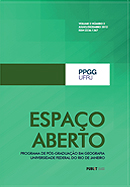Environmental Management of Oil Spills in the Brazilian Territorial Sea and the Use of Remote Sensing
DOI:
https://doi.org/10.36403/espacoaberto.2023.57435Keywords:
Pollution, Coastal Management, Disaster Management, Oil Production, Environmental MonitoringAbstract
Managing disasters caused by oil spills in Brazil is based on Law n. 9966/2000. However, its attendance represents a challenge to the Government, which has shown difficulties complying with this Law over the last few years. This article presents the legal instruments and the state programs used to assist in decision-making, during the occurrence of accidents, considering as reference the three main events that occurred in the last two decades in Brazil: the pipeline rupture in Guanabara Bay (2000), the oil spill in Campo de Frade (2011) and the oil pollution of undetermined origin on the beaches of the Northeast (2019/2020). Monitoring these events using remote sensing is discussed based on the scarce scientific production available, which highlights the need to encourage research and develop projects supporting state action during accidents.
Downloads
Downloads
Published
How to Cite
Issue
Section
License
Copyright (c) 2023 Osmar Abílio de Carvalho Júnior

This work is licensed under a Creative Commons Attribution-NonCommercial-ShareAlike 4.0 International License.



